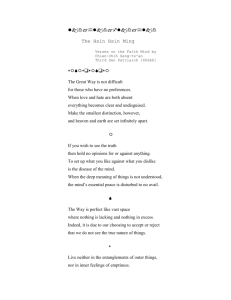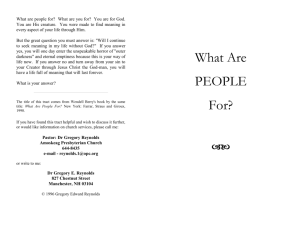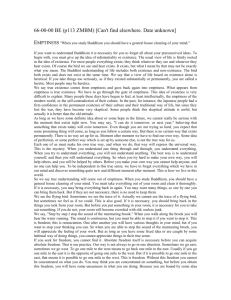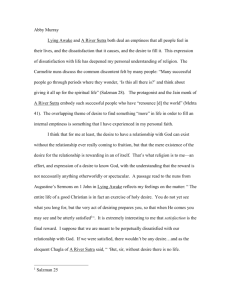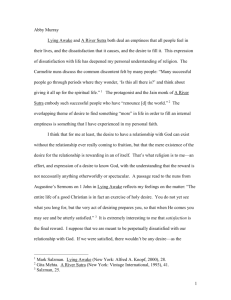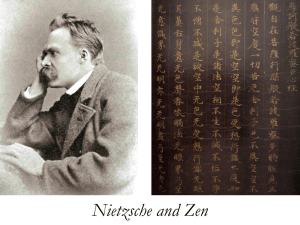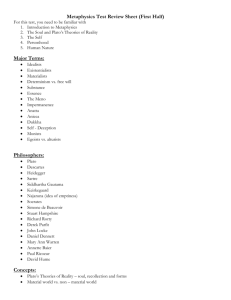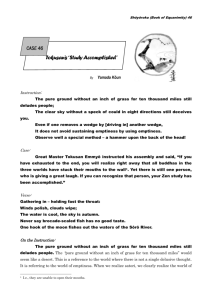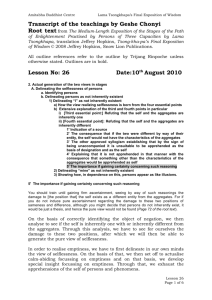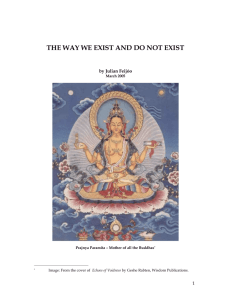Xian_DIALOGUE_FEB.2009
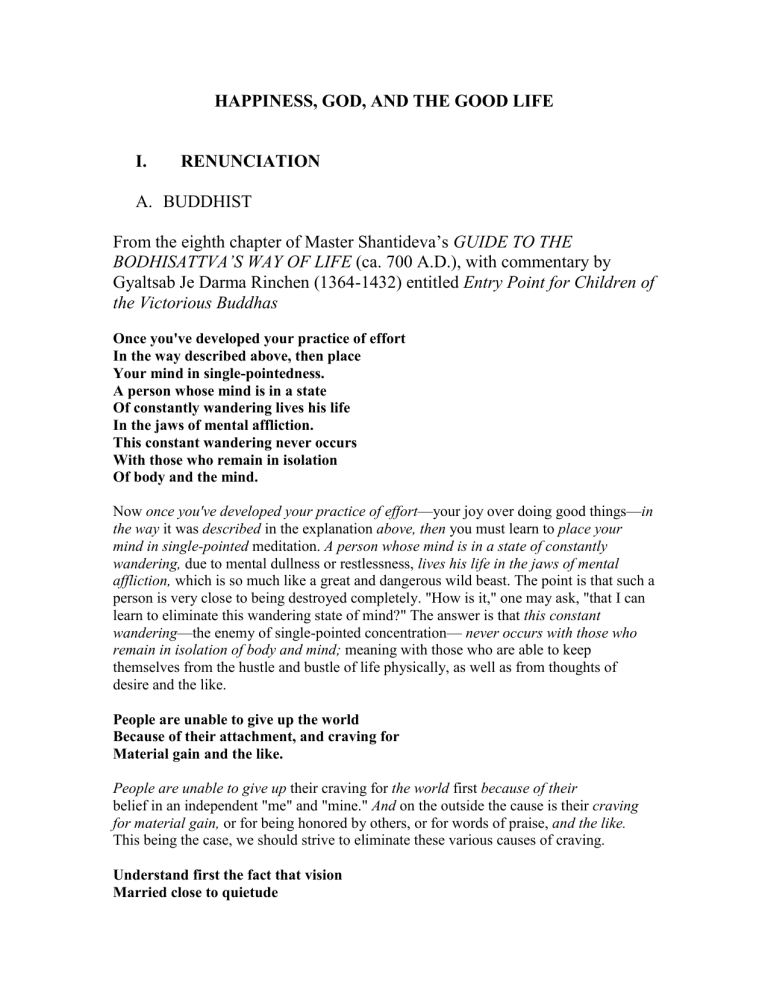
HAPPINESS, GOD, AND THE GOOD LIFE
I.
RENUNCIATION
A.
BUDDHIST
From the eighth chapter of Master Shantideva’s
GUIDE TO THE
BODHISATTVA’S WAY OF LIFE
(ca. 700 A.D.), with commentary by
Gyaltsab Je Darma Rinchen (1364-1432) entitled Entry Point for Children of the Victorious Buddhas
Once you've developed your practice of effort
In the way described above, then place
Your mind in single-pointedness.
A person whose mind is in a state
Of constantly wandering lives his life
In the jaws of mental affliction.
This constant wandering never occurs
With those who remain in isolation
Of body and the mind.
Now once you've developed your practice of effort —your joy over doing good things— in the way it was described in the explanation above, then you must learn to place your mind in single-pointed meditation. A person whose mind is in a state of constantly wandering, due to mental dullness or restlessness, lives his life in the jaws of mental affliction, which is so much like a great and dangerous wild beast. The point is that such a person is very close to being destroyed completely. "How is it," one may ask, "that I can learn to eliminate this wandering state of mind?" The answer is that this constant wandering —the enemy of single-pointed concentration— never occurs with those who remain in isolation of body and mind; meaning with those who are able to keep themselves from the hustle and bustle of life physically, as well as from thoughts of desire and the like.
People are unable to give up the world
Because of their attachment, and craving for
Material gain and the like.
People are unable to give up their craving for the world first because of their belief in an independent "me" and "mine." And on the outside the cause is their craving for material gain, or for being honored by others, or for words of praise, and the like.
This being the case, we should strive to eliminate these various causes of craving.
Understand first the fact that vision
Married close to quietude
Destroys the mental afflictions.
Begin then by seeking quietude;
It in turn is achieved by the bliss
Of losing attachment for the world.
You should understand first the following fact. Meditative quietude consists of practicing a state of single-pointedness upon some virtuous object until one has been able to eliminate mental restlessness and dullness from the mind; this then brings on a kind of bliss caused by the extreme manageability of the body and mind. This quietude is like a horse married to its rider, which is the special vision of realizing emptiness. The combination of the two then is able to destroy completely every mental affliction of the three realms, along with the seeds for these afflictions. Since this is the case, you must seek to achieve a special vision which brings on the state of manageability, which itself occurs through being able to analyze the true nature of existence. To achieve this vision though you must first begin by seeking meditative quietude, for it is impossible to develop special vision without first achieving this quietude.
It —this quietude— is in turn achieved by a feeling of bliss, which is caused by losing one's attachment to the world, in both the inner and the outer sense; that is, attachment to the body, to possessions, and so on. The reason for this is that attachment to these things makes us slaves of mental restlessness and dullness.
B.
CHRISTIAN
Mark 8:31-38:
Then he began to teach them that the Son of Man must undergo great suffering, and be rejected by the elders, the chief priests, and the scribes, and be killed, and after three days rise again. He said all this quite openly. And Peter took him aside and began to rebuke him.
But turning and looking at his disciples, he rebuked Peter and said, ‘Get behind me,
Satan! For you are setting your mind not on divine things but on human things.’
He called the crowd with his disciples, and said to them, ‘If any want to become my followers, let them deny themselves and take up their cross and follow me. For those who want to save their life will lose it, and those who lose their life for my sake, and for the sake of the gospel, will save it. For what will it profit them to gain the whole world and forfeit their life? Indeed, what can they give in return for their life? Those who are ashamed of me and of my words in this adulterous and sinful generation, of them the Son of Man will also be ashamed when he comes in the glory of his Father with the holy angels.’
II.
HEALING AND FORGIVING SINS
Mark 2:1-12:
When he returned to Capernaum after some days, it was reported that he was at home.
So many gathered around that there was no longer room for them, not even in front of the door; and he was speaking the word to them. Then some people came, bringing to him a paralysed man, carried by four of them. And when they could not bring him to Jesus because of the crowd, they removed the roof above him; and after having dug through it, they let down the mat on which the paralytic lay. When Jesus saw their faith, he said to the paralytic, ‘Son, your sins are forgiven.’ Now some of the scribes were sitting there, questioning in their hearts, ‘Why does this fellow speak in this way? It is blasphemy!
Who can forgive sins but God alone?’ At once Jesus perceived in his spirit that they were discussing these questions among themselves; and he said to them, ‘Why do you raise such questions in your hearts? Which is easier, to say to the paralytic, “Your sins are forgiven”, or to say, “Stand up and take your mat and walk”? But so that you may know that the Son of Man has authority on earth to forgive sins’—he said to the paralytic—‘I say to you, stand up, take your mat and go to your home.’ And he stood up, and immediately took the mat and went out before all of them; so that they were all amazed and glorified God, saying, ‘We have never seen anything like this!’
III.
CHERISHING OTHERS
EIGHT VERSES FOR DEVELOPING THE GOOD HEART , by the Diamond
Lion (Dorje Senge) of Langri Tang (1054-1123)
1) May I always cherish all sentient beings / By thinking of them as more precious,
Than a wish-fulfilling jewel, / And by aspiring to achieve the supreme goal.
2)
Wherever I am and whomever I’m with, / May I view myself as lowest of all;
And from the bottom of my heart, / May I cherish others and consider them supreme.
3) Watching my mind in all that I do, / With force may I immediately drive out /
Any mental afflictions as soon as they arise, / For they ruin both myself and others.
4) When I see beings with a bad nature, / Overwhelmed by their heavy misdeeds or suffering, May I care for them as if I had discovered / A jewel treasures, for they are so hard to find.
5) May I accept any loss from such unfair treatment / As being attacked and belittled
By those who are jealous of me; and / May I give every gain to others.
6) May I view one whom / I greatly hoped would help me, but
Instead mistreats or evens harms me / As my greatest spiritual teacher.
7) In brief, may I offer directly and indirectly / Help and happiness to all mother beings; And may I secretly take upon myself / All their harm and suffering.
8) May all of this be untainted by stains of the eight worldly attitudes, / And may the wisdom that knows / All existing things to be illusory / Bring freedom from the bonds of attachment.
IV.
DEATH AND RESURRECTION
Mark 16:1-8
When the sabbath was over, Mary Magdalene, and Mary the mother of James, and
Salome bought spices, so that they might go and anoint him. And very early on the first day of the week, when the sun had risen, they went to the tomb. They had been saying to one another, ‘Who will roll away the stone for us from the entrance to the tomb?’ When they looked up, they saw that the stone, which was very large, had already been rolled back. As they entered the tomb, they saw a young man, dressed in a white robe, sitting on the right side; and they were alarmed. But he said to them, ‘Do not be alarmed; you are looking for Jesus of Nazareth, who was crucified. He has been raised; he is not here.
Look, there is the place they laid him. But go, tell his disciples and Peter that he is going ahead of you to Galilee; there you will see him, just as he told you.’ So they went out and fled from the tomb, for terror and amazement had seized them; and they said nothing to anyone, for they were afraid.
John 20:19-23
When it was evening on that day, the first day of the week, and the doors of the house where the disciples had met were locked for fear of the Jews, Jesus came and stood among them and said, ‘Peace be with you.’ After he said this, he showed them his hands and his side. Then the disciples rejoiced when they saw the Lord. Jesus said to them
again, ‘Peace be with you. As the Father has sent me, so I send you.’
When he had said this, he breathed on them and said to them, ‘Receive the Holy Spirit.
If you forgive the sins of any, they are forgiven them; if you retain the sins of any, they are retained.’
V.
EMPTINESS
From Arya Nagarjuna’s ROOT TEXT ON THE MIDDLE WAY
( Mulamadhyamakakarika ), with commentary by Sumati Marut
13.5
There can be nothing with a self-nature,
Which also has the nature of being constantly changing,
Which turns into something else.
A youth does not age,
And the aged does not age.
Something with a self-nature or essence cannot become something else. If something truly exists as something it can’t turn into something it’s not. Conversely, if something is constantly changing, it can’t have a self-nature because that would mean it has an essence that doesn’t change. If there were a young person who truly or essentially existed as a young person, that young person could never grow old, for that would mean becoming something they are not. Similarly, if there were an essentially existing old person, they too could never change and grow older.
13.6
If there was something with a self-nature,
Which also had the nature of being constantly changing,
Then either milk would be the same as butter,
Or butter would come from something other than milk.
If there were something that somehow had a truly existing self-nature but changed, then either milk would be indistinguishable from the butter that it had transformed into
(because the self-nature of the two were the same), or milk and butter would be unrelated and wholly different things and one could not say that butter “came from” milk. In either case, something that has a self-nature cannot become something else – the idea that something essentially exists and also changes is illogical. Something either continues with its self nature (and therefore does not become “something else”) or changes (and thus becomes “something else” and loses its self-nature).
13.7
If there were something that wasn’t empty
Then there would be something we could call “empty.”
There is nothing that is not empty,
So how could there be something that is empty?
Here Arya Nagarjuna provides an extremely profound and somewhat subtle statement about how conceptual thought and language inevitably distort and reify things – including “emptiness” itself! Emptiness itself is empty. Emptiness and the something which “has emptiness” or “is empty” exist only interdependently and nominally. It is just a “way of speaking” to say “this thing is empty of self-existence.”
If there were really were something which had some kind of self-existence, then there
would be something that emptiness would refer to or be a quality of – we call that thing
“empty.” But since there is nothing which exists self-existently – since everything is empty of self-existence – then it makes no sense to say that there is “something which is empty.”
Emptiness is not a characteristic of something, for that would make it too something.
Emptiness is a negation, but even then we are always tempted to say that it is a negation of something . This verse warns us against being fooled and imprisoned by our own language and points to the fact that the truth about emptiness lies beyond and outside of language.
13.8
Emptiness has been taught by the Conquerors
As the refutation of all viewpoints.
Those for whom emptiness is a viewpoint
Are said to be hopeless.
This is a crucial verse. Emptiness is not just another philosophical standpoint or theory. It is the negation or refutation of all theories. Emptiness is not a positive thing and therefore one cannot make positive statements ( “it is this, it is that”) about it.
There is, finally, nothing to be asserted about emptiness or ultimate reality. As it says in the Tao te Ching
, “The tao that can be named is not the true tao”; or as it is articulated in the ancient Indian Upanishads
, “
Neti, neti
,” “It is not this, and it is not that.”
VI.
THE LAST JUDGEMENT
Matthew 25:31-46
‘When the Son of Man comes in his glory, and all the angels with him, then he will sit on the throne of his glory. All the nations will be gathered before him, and he will separate
people one from another as a shepherd separates the sheep from the goats,
33 and he will put the sheep at his right hand and the goats at the left. Then the king will say to those at his right hand, “Come, you that are blessed by my Father, inherit the kingdom prepared for you from the foundation of the world; for I was hungry and you gave me food, I was thirsty and you gave me something to drink, I was a stranger and you welcomed me, I was naked and you gave me clothing, I was sick and you took care of me, I was in prison and you visited me.” Then the righteous will answer him, “Lord, when was it that we saw you hungry and gave you food, or thirsty and gave you something to drink?
38
And when was it that we saw you a stranger and welcomed you, or naked and gave you clothing?
And when was it that we saw you sick or in prison and visited you?”
And the king will answer them, “Truly I tell you, just as you did it to one of the least of these who are members of my family, you did it to me.” Then he will say to those at his left hand,
“You that are accursed, depart from me into the eternal fire prepared for the devil and his angels; for I was hungry and you gave me no food, I was thirsty and you gave me nothing to drink, I was a stranger and you did not welcome me, naked and you did not give me clothing, sick and in prison and you did not visit me.” Then they also will answer, “Lord, when was it that we saw you hungry or thirsty or a stranger or naked or sick or in prison, and did not take care of you?” Then he will answer them, “Truly I tell you, just as you did not do it to one of the least of these, you did not do it to me.”
And these will go away into eternal punishment, but the righteous into eternal life.’
